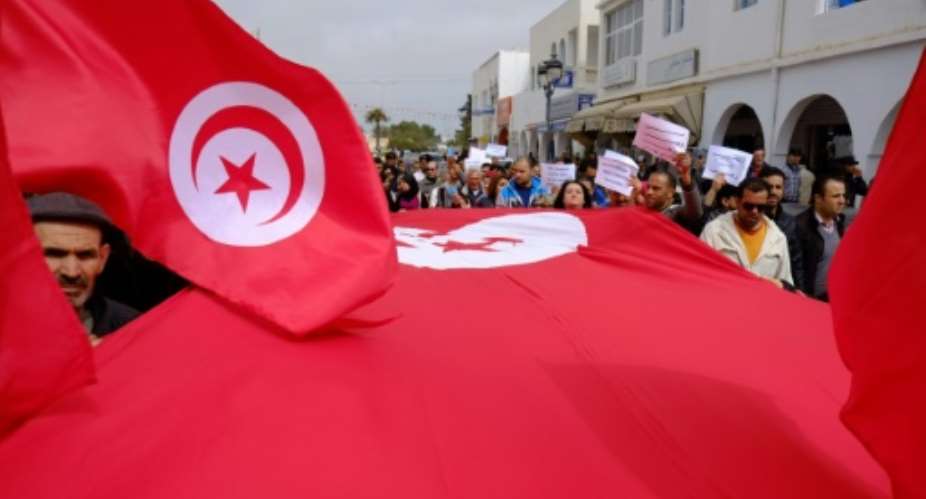Tunis (AFP) - Below are key dates in Tunisia since an uprising toppled president Zine El Abidine Ben Ali almost five years ago:
- 2010-2011: Revolution -
On December 17, 2010, Mohamed Bouazizi, a young university graduate who has only been able to find work as a fruit seller, sets himself alight to protest police harassment and unemployment in the central town of Sidi Bouzid. He dies on January 4.
That unleashes rioting against unemployment and the cost of living, which spreads across the country and takes on a political dimension, and 338 people are killed.
On January 14, 2011, thousands protest to demand that Ben Ali step down. The president flees to Saudi Arabia after 23 years in power, becoming the first Arab leader to quit under popular pressure.
- 2011: Islamists win election -
On October 23, Islamist group Ennahda, legalised in March, wins 89 of the 217 seats in a new constituent assembly in Tunisia's first free election. In December, the assembly elects ex-opposition leader Moncef Marzouki as president. Hamadi Jebali, Ennahda's number two, is charged with forming a government.
- 2012: Radical Islamist attacks, social unrest -
In June, and then in August, violent demonstrations and attacks by Islamists erupt.
On September 14 four attackers are killed in clashes at the US embassy amid protests by hundreds over an anti-Islam film.
From November 27 to December 1 riots break out in Siliana, to the southwest of Tunis, in which 300 are injured.
Since the summer sometimes violent strikes and demonstrations have affected industry, public services and transport and businesses. As during the revolution, the economically sidelined regions of the interior are where the unrest is focused.
- 2013: Opposition leaders killed -
On February 6 prominent anti-Islamist opposition leader Chokri Belaid is shot dead in Tunis, sparking deadly protests and a political crisis. On July 25, leftist opposition leader Mohamed Brahmi is also shot dead, near the capital. In December 2014 jihadists claim both killings.
Meanwhile, on July 29, eight soldiers are killed in an ambush in the Mount Chaambi area near Algeria where Tunisian forces have been hunting an Al-Qaeda-linked group since December 2012.
Authorities say a sharp rise in Islamist militancy has since killed about 60 security personnel.
- 2014: First free presidential poll -
On January 26, lawmakers adopt a new constitution after two years of turmoil, which exposed a deep rift between Ennahda and the secular opposition. A government of independents, led by Mehdi Jomaa and tasked with steering Tunisia to fresh elections, is sworn in, replacing the Islamist-led administration.
On October 26, the secular Nidaa Tounes party led by Beji Caid Essebsi comes top in legislative polls, winning 86 of 217 parliamentary seats.
On December 21, Essebsi defeats Marzouki in Tunisia's first free presidential election.
- 2015: Carnage in Tunis museum -
In 2015, the country suffers three attacks claimed by the Islamic State (IS), which is gaining a foothold in neighbouring Libya.
On March 18, 21 tourists and a policeman are killed as gunmen assail the Bardo museum in Tunis.
On June 26, the target is the Riu Imperial Marhaba Hotel in Port el Kantaoui, south of Tunis, where attackers kill 38 foreign tourists, including 30 from Britain.
And on November 24, a suicide bomber kills 12 members of a presidential security team in the capital.
Jihadist attacks on police and troops have killed dozens since 2011, many carried out by the Okba Ibn Nafaa Battalion, which has ties to Al-Qaeda in the Islamic Maghreb.
- Nobel Peace Prize -
The 2015 Nobel Peace Prize is awarded to the National Dialogue Quartet, four Tunisian groups that helped save the transition to democracy through dialogue between Islamists and those who oppose them.
On December 10, those groups urge the international community to make the fight against terrorism an "absolute priority".





 Lay KPMG audit report on SML-GRA contract before Parliament – Isaac Adongo tells...
Lay KPMG audit report on SML-GRA contract before Parliament – Isaac Adongo tells...
 Supervisor remanded for stabbing businessman with broken bottle and screwdriver
Supervisor remanded for stabbing businessman with broken bottle and screwdriver
 NDC watching EC and NPP closely on Returning Officer recruitment — Omane Boamah
NDC watching EC and NPP closely on Returning Officer recruitment — Omane Boamah
 Your decision to contest for president again is pathetic – Annoh-Dompreh blasts ...
Your decision to contest for president again is pathetic – Annoh-Dompreh blasts ...
 Election 2024: Security agencies ready to keep peace and secure the country — IG...
Election 2024: Security agencies ready to keep peace and secure the country — IG...
 People no longer place value in public basic schools; new uniforms, painting wil...
People no longer place value in public basic schools; new uniforms, painting wil...
 'Comedian' Paul Adom Otchere needs help – Sulemana Braimah
'Comedian' Paul Adom Otchere needs help – Sulemana Braimah
 Ejisu by-election: Only 33% of voters can be swayed by inducement — Global InfoA...
Ejisu by-election: Only 33% of voters can be swayed by inducement — Global InfoA...
 Minority will expose the beneficial owners of SML, recover funds paid to company...
Minority will expose the beneficial owners of SML, recover funds paid to company...
 Prof. Opoku-Agyemang has ‘decapitated’ the NPP’s strategies; don’t take them ser...
Prof. Opoku-Agyemang has ‘decapitated’ the NPP’s strategies; don’t take them ser...
